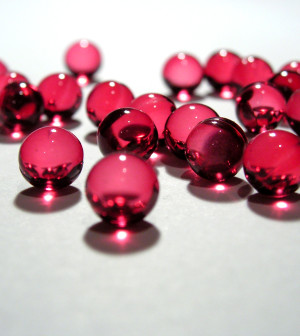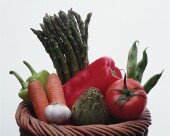- The Best Time of Day to Drink Bone Broth to Maximize Health Benefits
- 8 Ways to Increase Dopamine Naturally
- 7 Best Breads for Maintaining Stable Blood Sugar
- Gelatin vs. Collagen: Which is Best for Skin, Nails, and Joints?
- The Long-Term Effects of Daily Turmeric Supplements on Liver Health
- Could Your Grocery Store Meat Be Causing Recurring UTIs?
- Are You Making This Expensive Thermostat Error This Winter?
- Recognizing the Signs of Hypothyroidism
- 10 Strategies to Overcome Insomnia
- Could Artificial Sweeteners Be Aging the Brain Faster?
Vegetables in Childhood May Benefit Breast Health


Girls who ate the most fruits and vegetables rich in carotenoids were less likely to get benign breast disease, a new study suggests.
Carotenoids are a group of pigments that typically produce an orange, red or dark green color. They are believed to have antioxidant properties that may guard against disease.
Benign breast disease describes a variety of noncancerous conditions of the breast; some forms raise the risk of breast cancer.
“There have been a number of studies about carotenoids and breast cancer,” said lead researcher Caroline Boeke, a postdoctoral fellow at Channing Division of Network Medicine at Brigham and Women’s Hospital and Harvard School of Public Health, in Boston.
While the studies have produced mixed results, she said, overall they suggest a protective effect of the carotenoids. So her team decided to analyze the intake of these vegetables by girls enrolled in an ongoing study that began in 1996.
For her study, Boeke and her colleagues looked at food reports from 1996 through 1998 and then evaluated reports in 2005, 2007 and 2010 from girls who got a diagnosis of benign breast disease from a doctor after having a biopsy.
In all, Boeke studied nearly 6,600 girls, and 122 reported a diagnosis of benign breast disease.
When she looked at carotenoid intake, she found high intakes were protective. “The odds of benign breast disease in those who consumed the most beta carotene were about half that of those who consumed the least,” she said.
Girls in the highest intake group ate two to three servings of carotenoid-rich foods weekly, she said.
The study is published in the May issue of Pediatrics.
“It’s an observational study, so we can’t say for sure the carotenoids cause the lower risk,” Boeke noted. “We can only say there’s an association.”
She did take into account other factors that might affect the risk of benign breast disease, such as alcohol intake, physical activity, family history and body mass index (a measure of body fat using height and weight).
Why might the fruits and vegetables help? It’s not known for sure, but Boeke said it may be due partly to their antioxidant properties. Carotenoids absorb harmful substances known as free radicals which can harm cells.
The study looked only at food intake, not supplements, and Boeke said she would not recommend supplements since other research has found some harmful effects with supplement use.
Other foods that are rich in carotenoids include yams, melons, spinach and kale.
The most common kind of benign breast disease in teens and young women is a noncancerous tumor known as a fibroadenoma, according to Boeke.
The period of time between the start of a girl’s period and the first birth is a sensitive one for the breasts, as they are very vulnerable to environmental exposures, according to background information in the study.
Not many lifestyle habits have been shown to protect against benign breast disease, said Dr. Joanne Mortimer, director of women’s cancer programs and co-director of the breast cancer program at the City of Hope Comprehensive Cancer Center, in Duarte, Calif.
The study has limitations, she said, including the self-report by the girls of a benign breast disease diagnosis by a doctor and the food questionnaires, which are always subject to error since it’s difficult to remember exactly what was eaten.
More information
To learn more about benign breast disease, visit the American Cancer Society.
Source: HealthDay
Copyright © 2026 HealthDay. All rights reserved.










